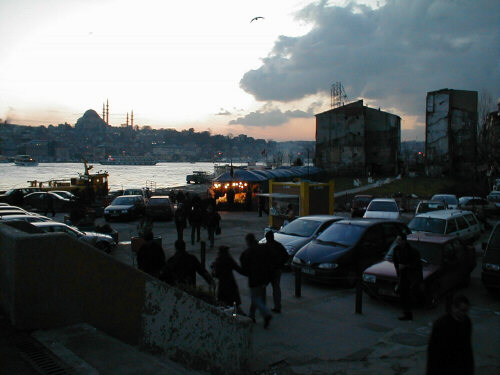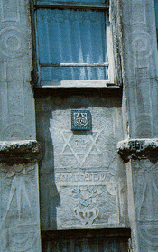 Sara Liss
Sara LissAnd yet, when advertising is done through flyers or notices, there is nary a mention of location or date. Usually, people who are 'in the know' are aware of where and when to attend. To live within such a contradiction - where everything is common knowledge yet nothing can be acknowledged - is to be a Jew in Turkey.
"Turks do not hate Jews, they hate Armenians," a friend in the Istanbul Jewish community once told me, referring to mass genocide of Armenians in Turkey at the turn of the century and the still rampant mistrust between the two ethnic groups. He said that anti-Semitism was not the reason behind Turkish Jews' desire to keep a low profile: all religious groups in Turkey keep displays of religiosity to a minimum - whether Muslim, Christian, or Jewish. This was a strange conversation to be having with a man whose father was one of the twenty three people shot and killed during the attack on the Neve Shalom synagogue in 1986. "That was not Turks, that was Palestinians - Abu Nidal," he said, a distinction also drawn on the Neve Shalom website following the recent terrorist attacks. For my friend, his country was violated by others; his father's murder, complicated and painful, was not a symptom of anti-Semitism among Turks. It was a result of Turkey having "soft borders."
I first learned what "soft borders" meant when I met with the head of security for the Israeli consulate in Istanbul. As an employee of the Jewish Agency for Israel I was considered an Israeli diplomat and so part of the security briefings and measures all members of the Israel's diplomatic team underwent while living in Istanbul.
"You may think that because Israel and Turkey have good relations, you are safe here. In fact, Turkey is one of the most dangerous countries in the Middle East," the security officer in a stiff blue suit explained. "Turkey allows in the country all varieties of Arab and Muslim citizens. In the street you may be walking amongst Syrians, Egyptians, Pakistanis, and you would never know it. These people are not monitored and there is not much we can do except take precautions to protect ourselves against unforeseen circumstances." The security chief then proceeded to explain to us how to check our cars for explosives each time we used them, how we should take a different route to the grocery store each week, how never to open the door if someone tries to deliver an unsolicited package. We were told to have our mail delivered to the consulate office. Each time our care packages from home were checked, even the Bamba, a popular Israeli snack.
 And yet, despite this insecurity, the Jews have inherited many customs and cultural mores from Turkish culture. Some are prosaic, such as not crossing one's legs in synagogue, for both men and women. It was difficult to decipher the reason for this custom: some said it was because you were creating a cross with your body, an allusion to a Christian icon, others said it was because you would never sit on your mother-in-law's house that way (i.e. with comfort). Others are more politically significant, such as reverence for Ataturk, the famous Turkish reformer who transformed Turkey from a Muslim monarchy to a secular republic.
And yet, despite this insecurity, the Jews have inherited many customs and cultural mores from Turkish culture. Some are prosaic, such as not crossing one's legs in synagogue, for both men and women. It was difficult to decipher the reason for this custom: some said it was because you were creating a cross with your body, an allusion to a Christian icon, others said it was because you would never sit on your mother-in-law's house that way (i.e. with comfort). Others are more politically significant, such as reverence for Ataturk, the famous Turkish reformer who transformed Turkey from a Muslim monarchy to a secular republic.
But what the Jewish Turks seem to most have in common with their Muslim neighbors is a laconic demeanor, allegiance to tradition, and a resistance to change. This is when my Turkish friend would remind me that things in Turkey happen "Yavash, yavash," slowly, slowly. Change would come only through a slow process, through patience, by gently pushing through the haze of routine a shiny new idea. Once, while teaching a weekly Hebrew class to women of the community, they were perplexed by the variety of Hebrew words available to communicate the act of speaking or telling. In Turkish there is simply one verb - "soylemak," to say - and that, I explained, is because Turks rarely talk, but Israelis are always talking, chatting, arguing.



Harvard Death Fugue
On the Exploitation of Bruno Schulz
James Russell
The Jews of Istanbul
Sara Liss
The Truth about the Rosenbergs
Joel Stanley
Thinking despite Doubt, Feeling despite Truth
Jay Michaelson
Two Rituals
Joshua Bolton
Hepster Advice
Jennifer Blowdryer
Josh Goes to the Hospital
Josh Ring
Archive
Our 400 Back Pages
Saddies
David Stromberg
Zeek in Print
Winter 03 issue now on sale
About Zeek
Events
Contact Us
Links
From previous issues:
Germanophobia
Michael Shurkin
Shtupping in the Shadow of the Bomb
Marissa Pareles
The Other Rally
Samuel Hayim Brody